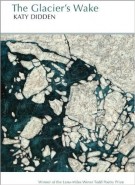
Book Review: The Glacier’s Wake by Katy Didden

The Glacier’s Wake
Poems by Katy Didden
LSU Press, April 2013
ISBN-13: 978-0807152003
$17.95; 92 pp.
Reviewed by Allison Donohue
Katy Didden’s The Glacier’s Wake explores the transience of the glacier. In her introductory, titular poem, “The Glacier’s Wake,” Didden’s speaker defines the glacier “as alive as how I thought my grief should be—” establishing the fulcrum of her work. It is a deep grief rather than an outspoken grief, limitlessly held beneath the surface of nearly every poem in the form of a gentle, growing awareness.
Take “Embrace them All,” for example. The speaker, while running in Paris, meets a young musician in the park. The poem culminates as the speaker acknowledges her youth—she, young, believes herself infinite, stating in the final line: “Oh, but me, I thought I was immortal.” This retrograde perspective—when previously the poem had lingered in the limberness of running then resting mere feet from the hill known to be the place where “if you stand on tiptoe you can see the Eiffel Tower”—when contextualized within the collection, dramatically alters the perspective of present significance. After all, “…no one cares much what we do / in little knolls behind reedy forsythia, / in the middle of a Tuesday, in the middle / of living.” Living is our pacesetter.
Additionally, “Avalanche,” in which the speaker introduces Liliana and her death in Innsbruck on her honeymoon, heightens Didden’s awareness of humanity’s fragility. And, too, of humanity’s pleasures: “I think how,” the speaker says, “she must have loved / the feel of the Himalayas / underfoot.” Didden’s centerpiece for the collection reaches, at eight pages in length, a depth the previous poems only subtly touch. Death looms, witnesses.
Elegiac, yes. But Didden—as fond of art as she must be to include “The Wasp on Renaissance Painters,” or a poem after an oil painting by Louis Comfort Tiffany, or a poem of carving stone—writes to her strength when her poems wind their way around a scene in the fashion of a roving lens. Take “Lamoille County Field Days,” for example:
…………………………………………………….And while the girls race,
swigging the milk through pinholes in the nipples,
the giant Belgian horses chew the red fence that corrals them,
and the cashier slips out the back of the barn and wanders
behind the white tents to the farthest fencepost
where the field dips down toward the Gihon and she can see
the fog reaching up to the ghost-height of the ice, eons ago,
that shaped this place and packed the soil into a fertile valley.
Even in this Vermont rurality the glacier lurks: originator; block of ice upon which we first stood. The glacier speaks throughout: “The Glacier on Middle-Age,” “…on the Close-Up,” “…on Lack of Sleep” etc. The wasp and the sycamore, too, repeatedly speak. Didden enters nature, zooming inward and outward upon the glacier: “‘the monument’” to the realization of “to be not under, but / inside ice.” Likewise, she morphs the wasp from insect into the god of weddings, “Hymenaeus,” flitting between the bridal party and the cutlery.
Choosing these seemingly mute but colossal beings—whether in size or enlargement through myth—there is a soft but present voicing throughout the collection. Perhaps saying: “When I should have left off grieving, / I carried you with me across the water.” Persistent grief, the persistence of the presence of death knock quietly at the words of nearly every poem in The Glacier’s Wake where grief lives in the most immense sense: not only the loss of a father (though that be tremendous), but the loss of love, of life to time, to situation, the loss of people one meets who file into absence. There is a movement of season and cycle throughout this collection as represented through the sycamore’s words on forgiveness: “green shoots / spring from the mess you mangled.”
Yet, life, too, persists. Didden’s speakers often float through it as though waking to a petrichor morning: grief being an eye to swim beneath, yet still to swim: “Your beauty is now up to you.”
Allison Donohue, born in Washington DC, grew up in Centreville, Virginia mere miles from The Bull Run Battle Fields. Holding an MA in Poetry from Texas Tech University, she will begin her MFA at the University of Oregon in September 2015 where she will continue to write with her windows open. Her poetry is forthcoming in Forklift, Ohio and The Cortland Review.

Leave a Reply